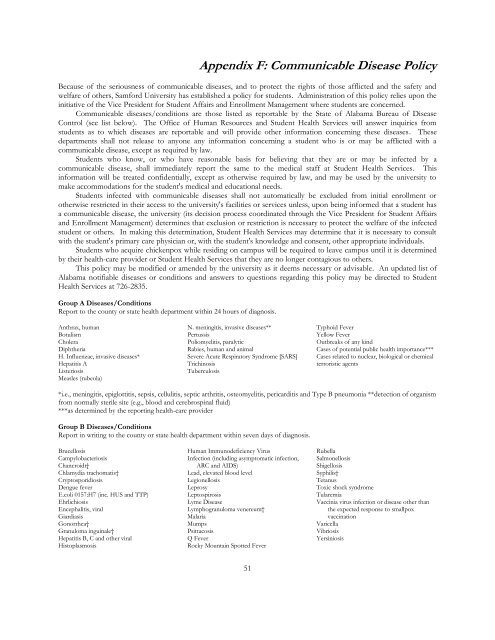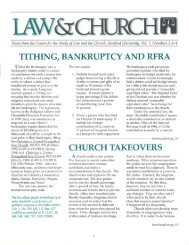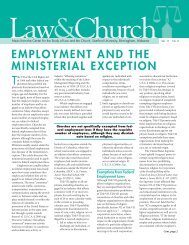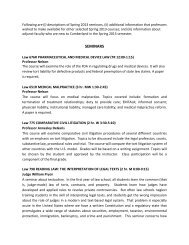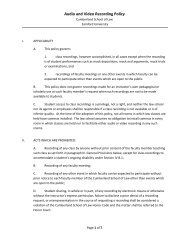STUDENT HANDBOOK - Cumberland School of Law - Samford ...
STUDENT HANDBOOK - Cumberland School of Law - Samford ...
STUDENT HANDBOOK - Cumberland School of Law - Samford ...
Create successful ePaper yourself
Turn your PDF publications into a flip-book with our unique Google optimized e-Paper software.
Appendix F: Communicable Disease Policy<br />
Because <strong>of</strong> the seriousness <strong>of</strong> communicable diseases, and to protect the rights <strong>of</strong> those afflicted and the safety and<br />
welfare <strong>of</strong> others, <strong>Samford</strong> University has established a policy for students. Administration <strong>of</strong> this policy relies upon the<br />
initiative <strong>of</strong> the Vice President for Student Affairs and Enrollment Management where students are concerned.<br />
Communicable diseases/conditions are those listed as reportable by the State <strong>of</strong> Alabama Bureau <strong>of</strong> Disease<br />
Control (see list below). The Office <strong>of</strong> Human Resources and Student Health Services will answer inquiries from<br />
students as to which diseases are reportable and will provide other information concerning these diseases. These<br />
departments shall not release to anyone any information concerning a student who is or may be afflicted with a<br />
communicable disease, except as required by law.<br />
Students who know, or who have reasonable basis for believing that they are or may be infected by a<br />
communicable disease, shall immediately report the same to the medical staff at Student Health Services. This<br />
information will be treated confidentially, except as otherwise required by law, and may be used by the university to<br />
make accommodations for the student's medical and educational needs.<br />
Students infected with communicable diseases shall not automatically be excluded from initial enrollment or<br />
otherwise restricted in their access to the university's facilities or services unless, upon being informed that a student has<br />
a communicable disease, the university (its decision process coordinated through the Vice President for Student Affairs<br />
and Enrollment Management) determines that exclusion or restriction is necessary to protect the welfare <strong>of</strong> the infected<br />
student or others. In making this determination, Student Health Services may determine that it is necessary to consult<br />
with the student's primary care physician or, with the student's knowledge and consent, other appropriate individuals.<br />
Students who acquire chickenpox while residing on campus will be required to leave campus until it is determined<br />
by their health-care provider or Student Health Services that they are no longer contagious to others.<br />
This policy may be modified or amended by the university as it deems necessary or advisable. An updated list <strong>of</strong><br />
Alabama notifiable diseases or conditions and answers to questions regarding this policy may be directed to Student<br />
Health Services at 726-2835.<br />
Group A Diseases/Conditions<br />
Report to the county or state health department within 24 hours <strong>of</strong> diagnosis.<br />
Anthrax, human<br />
Botulism<br />
Cholera<br />
Diphtheria<br />
H. Influenzae, invasive diseases*<br />
Hepatitis A<br />
Listeriosis<br />
Measles (rubeola)<br />
N. meningitis, invasive diseases**<br />
Pertussis<br />
Poliomyelitis, paralytic<br />
Rabies, human and animal<br />
Severe Acute Respiratory Syndrome [SARS]<br />
Trichinosis<br />
Tuberculosis<br />
51<br />
Typhoid Fever<br />
Yellow Fever<br />
Outbreaks <strong>of</strong> any kind<br />
Cases <strong>of</strong> potential public health importance***<br />
Cases related to nuclear, biological or chemical<br />
terroristic agents<br />
*i.e., meningitis, epiglottitis, sepsis, cellulitis, septic arthritis, osteomyelitis, pericarditis and Type B pneumonia **detection <strong>of</strong> organism<br />
from normally sterile site (e.g., blood and cerebrospinal fluid)<br />
***as determined by the reporting health-care provider<br />
Group B Diseases/Conditions<br />
Report in writing to the county or state health department within seven days <strong>of</strong> diagnosis.<br />
Brucellosis<br />
Campylobacteriosis<br />
Chancroidt†<br />
Chlamydia trachomatis†<br />
Cryptosporidiosis<br />
Dengue fever<br />
E.coli 0157:H7 (inc. HUS and TTP)<br />
Ehrlichiosis<br />
Encephalitis, viral<br />
Giardiasis<br />
Gonorrhea†<br />
Granuloma inguinale†<br />
Hepatitis B, C and other viral<br />
Histoplasmosis<br />
Human Immunodeficiency Virus<br />
Infection (including asymptomatic infection,<br />
ARC and AIDS)<br />
Lead, elevated blood level<br />
Legionellosis<br />
Leprosy<br />
Leptospirosis<br />
Lyme Disease<br />
Lymphogranuloma venereum†<br />
Malaria<br />
Mumps<br />
Psittacosis<br />
Q Fever<br />
Rocky Mountain Spotted Fever<br />
Rubella<br />
Salmonellosis<br />
Shigellosis<br />
Syphilis†<br />
Tetanus<br />
Toxic shock syndrome<br />
Tularemia<br />
Vaccinia virus infection or disease other than<br />
the expected response to smallpox<br />
vaccination<br />
Varicella<br />
Vibriosis<br />
Yersiniosis


